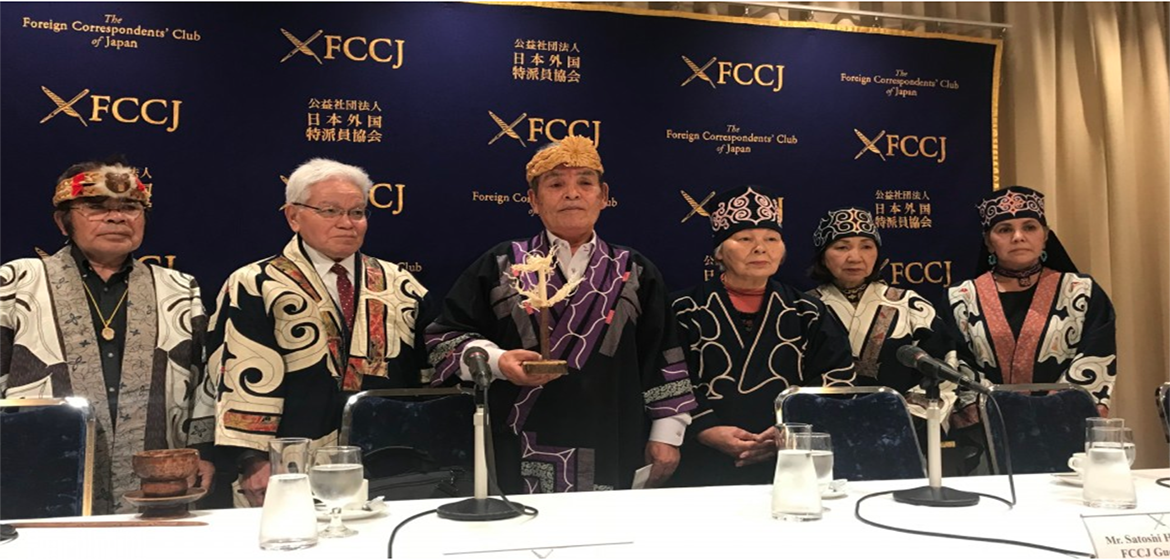By Mariko Tamura
Tokyo - Some rights groups criticized the Japanese government Friday over a recent bill recognizing the Ainu people for the first time as "an indigenous group," saying that despite the wording, it treats them as a tourist attraction and does not do enough to reverse the historical discrimination they have suffered.
Calling the bill "deplorable," some representatives of the ethnic minority, with roots in the northernmost main island of Hokkaido, said the group's voices and rights have been ignored.
The bill, which the government approved on Feb. 15, says its objective is to "realize a society which will respect the pride of the Ainu," who also live in parts of Russia near Hokkaido.
"There has been no apology...The bill refers to the Ainu as indigenous people but they are empty words," said Yuji Shimizu, chairman of the Ainu Kotan no Kai at the Foreign Correspondents' Club of Japan, demanding its "immediate withdrawal and resubmission."
The government is seeking to enact the legislation during the ongoing 150-day parliamentary session, which will end in late June if not extended.
"There is no content in any of the articles mentioning indigenous rights, in other words the right to self-determination, the right to land, etc.," Shimizu said, noting the government had stripped the Ainu of their entitlements and resources starting in the late 19th century.
Beginning with the government's assimilationist policy in the Meiji Era (1868-1912), the ethnic minority has suffered discrimination, spilling over into income and educational disparities. The Ainu have also struggled to maintain their culture and language.
Government policy has been so detrimental that their actual number is difficult to ascertain. A 2017 Hokkaido survey lists the Ainu population as slightly more than 13,000, but some estimates put it as high as 250,000.
A 1997 law replaced the almost century-old assimilationist law and acknowledged for the first time the existence of an ethnic minority in Japan, but it did not call the Ainu an indigenous group.
The new bill aims to reverse that. It also comes more than a decade after Japan supported a U.N. declaration in 2007 that confirmed the rights of indigenous people as a group.
The bill says it aims to realize a society that will respect the Ainu people, which is a "duty" for both the central and local governments. Municipality projects aimed at preserving Ainu culture and developing their communities will be subsidized by the government.
"Positioning Ainu culture at the center for proposals to promote tourism is nothing other than a scheme to sacrifice or exploit living Ainu as a resource for tourism," Shimizu said, adding he has "very strong reservations and unease about the system of financial subsidies."
There will be a new national Ainu museum and park in the Hokkaido town of Shiraoi in April 2020, three months before the Tokyo Olympics. It is expected to bring in one million visitors.
"This is going to feed a few mouths but this is not a typical situation in our Ainu society," said Satoshi Hatakeyama, chairman of the Mombetsu Ainu Association. "I would like to see actualization of inherent indigenous rights such as the right to fish and to harvest whales."
The bill would also relax restrictions on traditional Ainu salmon fishing and timber collection in national forests for their rituals. However, Mochihiro Ichikawa, a lawyer at the press conference, said this too was for cultural promotion and was not based on collective rights.
Article 13 of the Japanese Constitution already protects the rights of individual citizens, including the Ainu. But the U.N. Declaration on the Rights of Indigenous Peoples is based on the recognition of group rights.
"What's been talked about is the right of the group as a collective and that's what the Japanese government refuses to acknowledge. The fundamental stance is that they will not recognize collective rights on certain activities," Ichikawa said.
"The new bill is the consummation of the assimilation policy," he said.
Source:
Related to SDG 10: Reduced inequalities and SDG 16: Peace, justice and strong institutions



